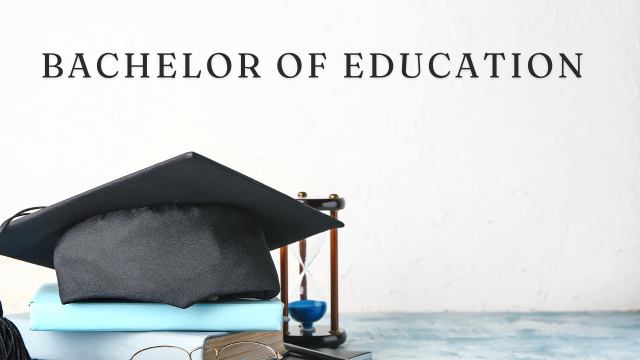The B.Ed (Bachelor of Education) is a crucial degree for those aspiring to enter the teaching profession in India. This two-year undergraduate program equips candidates with the skills, knowledge, and methodologies necessary to become effective educators. If you are planning to apply for B.Ed admission in 2024, it’s essential to understand all aspects, including the full form of B.Ed, the syllabus, eligibility criteria, entrance exams, and the admission process. This blog post provides a comprehensive guide to help you navigate your B.Ed journey.
What is the B.Ed Full Form?
B.Ed stands for Bachelor of Education. This degree is mandatory for individuals aiming to teach at primary, secondary, or higher secondary levels in schools. The B.Ed program is designed to train teachers in both theoretical and practical aspects of teaching, ensuring they are well-prepared to handle classroom challenges.
Importance of a B.Ed Degree
A B.Ed degree is more than just a certification; it’s a structured training program that develops professional teaching skills. It emphasizes:
- Pedagogical techniques
- Classroom management strategies
- Educational psychology
- Subject-specific teaching methods
Graduating with a B.Ed not only opens doors to teaching positions in public and private schools but also enhances your understanding of the education system.
B.Ed Eligibility Criteria 2024
Understanding the eligibility criteria is the first step towards applying for a B.Ed program. Here are the main requirements:
- Educational Qualification: Candidates must have a minimum of a bachelor’s degree in any discipline (Arts, Science, or Commerce) from a recognized university. Some institutions may require a minimum aggregate score of 50-55%.
- Age Limit: There is usually no upper age limit for B.Ed admissions, although some institutions may set a lower age limit of 19 years.
- Reservation Criteria: Reserved categories (SC/ST/OBC) may receive relaxation in minimum marks and other eligibility criteria as per government norms.
B.Ed Entrance Exams 2024
Admission to a B.Ed program is typically based on entrance exams conducted at national, state, or university levels. Some of the popular B.Ed entrance exams in 2024 include:
1. DU B.Ed Entrance Exam
- Conducting Body: Delhi University
- Exam Pattern: Multiple-choice questions on General Knowledge, Teaching Aptitude, Reasoning, and Language Proficiency.
- Selection Process: Admission is based on the entrance exam score and counseling.
2. IGNOU B.Ed Entrance Exam
- Conducting Body: Indira Gandhi National Open University (IGNOU)
- Exam Pattern: The exam tests general awareness, teaching aptitude, and language skills.
- Selection Process: The entrance score determines admission, followed by document verification.
3. AP EdCET
- Conducting Body: Andhra Pradesh State Council of Higher Education (APSCHE)
- Exam Pattern: Questions on General Knowledge, Teaching Aptitude, and Language Proficiency.
- Selection Process: Admission is granted based on the exam score and seat availability.
4. MAH B.Ed CET
- Conducting Body: Maharashtra State Common Entrance Test Cell
- Exam Pattern: The test covers General Knowledge, Logical Reasoning, and Teaching Aptitude.
- Selection Process: Admission is granted through a centralized counseling process.
B.Ed Admission Process 2024
The B.Ed admission process generally involves multiple steps, including filling out the application form, appearing for the entrance exam, and participating in counseling. Here’s a detailed overview of the steps involved:
1. Application Form Submission
Candidates must first fill out the application form for the respective entrance exam or university. This process is usually conducted online, where applicants provide personal details, academic qualifications, and upload required documents.
2. Entrance Exam
After submitting the application, candidates must appear for the entrance exam. The syllabus typically includes:
- General Knowledge: Questions on current events, history, geography, and social issues.
- Teaching Aptitude: Tests candidates’ understanding of educational concepts and classroom management techniques.
- Reasoning Ability: Questions on logical reasoning, problem-solving, and analytical thinking.
- Language Proficiency: Tests command over English, Hindi, or the regional language.
3. Result Declaration
Once the entrance exam is completed, results are usually declared within a few weeks. Candidates are ranked based on their performance, and cut-offs are announced by individual institutions.
4. Counseling and Seat Allotment
Qualified candidates are then invited for counseling sessions where they can select their preferred colleges. The final seat allotment is based on entrance exam scores, seat availability, and the candidate’s preference.
5. Document Verification and Admission Confirmation
Once a seat is allotted, candidates must verify their documents and pay the admission fee to confirm their place in the program.
B.Ed Syllabus and Course Structure
The B.Ed syllabus is designed to cover both theoretical and practical aspects of teaching. It is divided into four semesters over two years and includes core subjects, electives, and teaching practice. Here’s a breakdown of the key components:
1. Core Subjects
These subjects lay the foundation for understanding educational theories and practices:
- Philosophical and Sociological Foundations of Education: Explores the role of education in society, ethical aspects, and historical developments.
- Educational Psychology: Focuses on understanding learner behavior, cognitive development, and learning theories.
- Childhood and Growing Up: Discusses the stages of child development and the role of educators in nurturing growth.
2. Pedagogy of School Subjects
This segment focuses on teaching methods for specific subjects like:
- Mathematics
- Science
- Social Science
- Language (English, Hindi, etc.)
- Arts and Crafts
3. Teaching Practice
Practical training is an essential part of the B.Ed curriculum. Students are required to complete:
- Micro-Teaching Sessions: Practicing teaching techniques in a controlled environment.
- Internship: Real-world teaching experience in schools, where students plan lessons, manage classrooms, and engage with students.
4. Electives
B.Ed students can choose from a variety of elective subjects based on their interest areas. These may include:
- Environmental Education
- Special Education
- Educational Technology
- Guidance and Counseling
5. Assessment Methods
B.Ed programs use a mix of internal assessments, written exams, and practical evaluations to gauge student performance. Regular workshops, seminars, and group discussions are also part of the curriculum.
Career Opportunities After B.Ed
Upon completing a B.Ed degree, a range of career options become available:
- School Teacher: Teaching positions in primary, secondary, and higher secondary schools.
- Private Tutor: Providing personalized tutoring sessions.
- Educational Consultant: Advising educational institutions on curriculum design and teaching strategies.
- Content Developer: Creating educational content for textbooks, e-learning platforms, and other educational resources.
- Administrative Roles: Positions such as school principal, vice-principal, or academic coordinator.
FAQs
1. What is the full form of B.Ed?
The full form of B.Ed is Bachelor of Education. It is a two-year undergraduate degree required for teaching positions in schools.
2. What are the eligibility criteria for B.Ed admission?
Candidates must have a bachelor’s degree in any discipline with a minimum of 50-55% aggregate marks. Reserved categories may receive relaxation as per government norms.
3. Which entrance exams are necessary for B.Ed admission?
Popular entrance exams include DU B.Ed, IGNOU B.Ed, AP EdCET, and MAH B.Ed CET. The specific exam depends on the institution and state you are applying to.
4. What is included in the B.Ed syllabus?
The B.Ed syllabus includes core subjects like educational psychology, pedagogy of school subjects, teaching practice, and elective subjects such as environmental education and special education.
5. What are the career options after completing a B.Ed degree?
After completing B.Ed, graduates can work as school teachers, private tutors, educational consultants, content developers, and take up administrative roles in educational institutions.
Conclusion
A B.Ed degree is an essential qualification for anyone aspiring to build a career in education. It not only provides the theoretical knowledge required for teaching but also offers practical training to handle classroom dynamics effectively. Understanding the B.Ed full form, syllabus, eligibility, entrance exams, and the admission process can set you on the right path for your teaching career in 2024.











